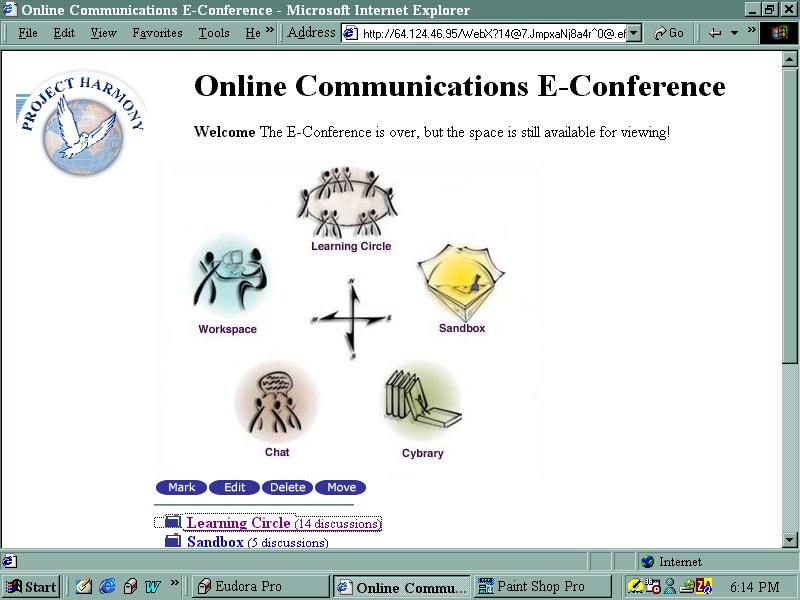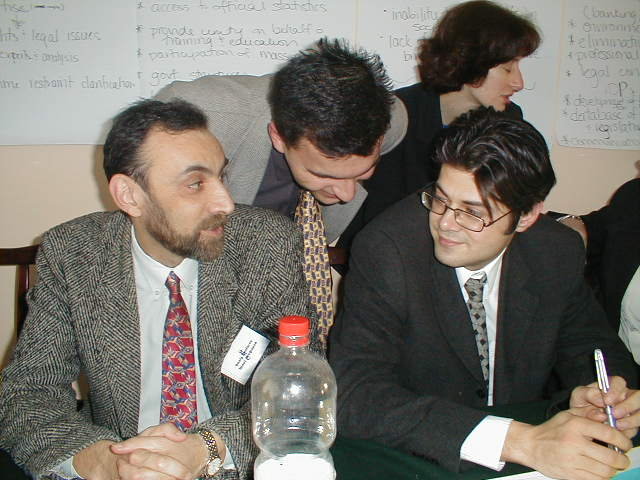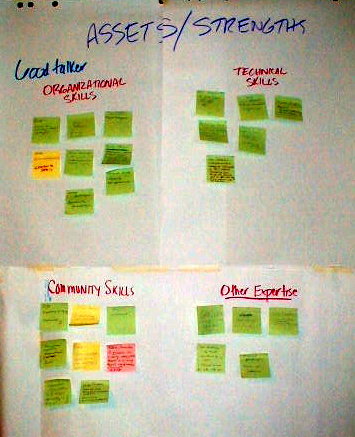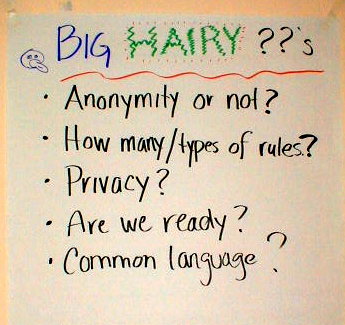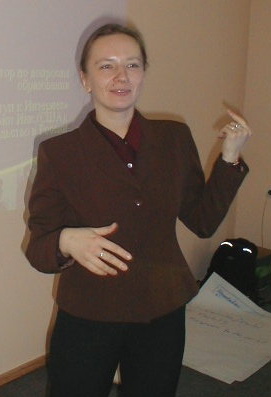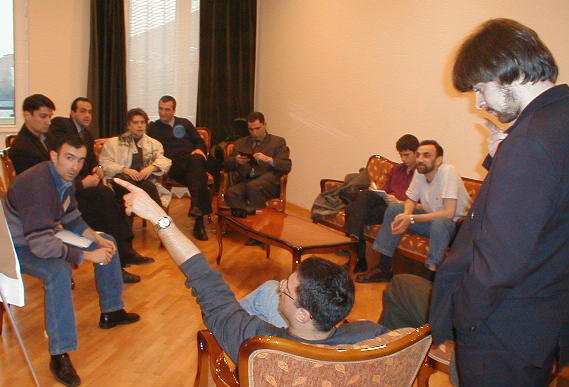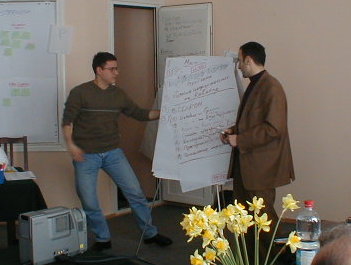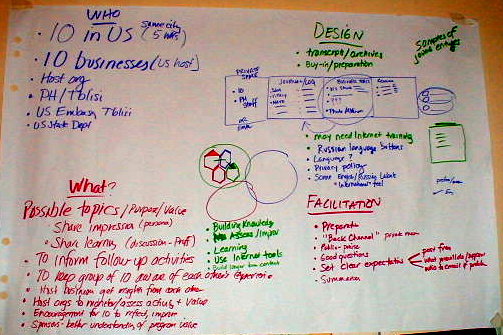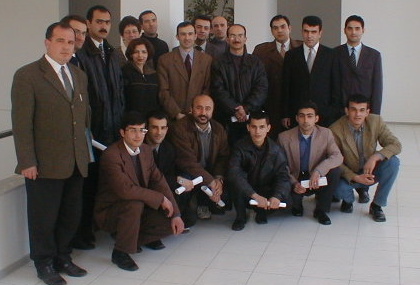|
[ Home | Online Community Toolkit|Online Community Resources ] Changing Lenses: Nancy White, Full Circle Associates In a hurry? Scroll down for Lessons Learned at the bottom! For the official conference report, please see ICD Tblisi Conference Summary. I've been an evangelist for online communications for quite some time now, convinced that when we pay attention to the human dynamics, the Internet can be a positive agent for connection and change. The opportunity to take these practices to another culture, another "reality," has given me a whole new framework in which to view my beliefs and ideas. I, the trainer, was indeed the student. I was privileged to view things through a whole new lens. This has deepened my knowledge and affirmed my conviction that the Internet offers us a tool for positive community change. For two weeks in March of 2001, I was the guest of the Project Harmony Internet Community Development ( ICD ) Project in the Caucasus. My role as one of three "American Trainers" was to share my knowledge and experience of online communications, and community and facilitate exploration of the application of "online community" to local needs. The trip itself was preceded by a two-week online conference on online communications, which was attended by 33 participants from Project Harmony and a variety of organizations from the region (some of who also attended the Tblisi meeting), and an online planning process. Though the e-conference was not directly related to the offline "trainers in residence" contract with Project Harmony, it was influential in the success of the 5-day, three-country conference in Tblisi, Georgia, capped by a week of community meetings in Ganja and Baku, Azerbaijan. One small, but very important side note. How did this all come about? How did a lone consultant in Seattle, Washington, connect with a relatively small Internet project based in Baku, Azerbaijan? The Internet, of course. It is not insignificant that the Internet Community Development (ICD) director, Paul Lawrence, was out on the web looking for resources and information and was referred to my site. Almost at the same moment, he was referred to me by a staffer at a Seattle non-profit providing technical support to other non-profits. That's how Paul came to fill a scholarship spot in my December online course and we began to share ideas. Chance? Coincidence? No, the networking power of the Internet. Hold this thought... The February E-Conference
Talking about online community and communications can be a tough proposition. Even the word "community" can lead us down diverse, and often blind alleys as we each hold a different picture of "community" in our head. Imagine how many divergent ideas come up when we start talking online about such a broad topic. The critical task is to move from the theoretical (and often over idealized) discussions of "online community" to a hands-on practical exploration of Internet communications. What can we do (well) together online? With what tools? What techniques? Can we form strong working relationships online? Can we address intercultural communications issues online? Can we even plan events online? The goal of the two-week E-Conference was to both provide a tangible example of online interaction, and explore the techniques of successful online communications. It was our springboard to test these ideas and get tangible feedback from interested parties in the Caucasus and Russia. We considered these "interested parties" the probable "early adopters" willing to try something new -- people with some existing interest, knowledge and expertise. They are also potential "evangelizers" of ICD ideas. The conference planning was done entirely online in my private web-based discussion area. I had one phone contact with Paul when he was in the US for a meeting in December. Despite a 12-hour time zone difference and a text-only environment, we efficiently worked together, learning to adjust to each other's style and the needs of the project. This is an example of the type of processes needed for online collaboration. The structure of the conference was a customized version of Full Circle Associates' " Hosting Online Communities ". The full agenda can be found here. We had some concerns about language and cultural issues that drove our adaptations which consisted of:
The ICD staff recruited the participants. By working across organizations, they were able to share the costs of the event with others, and build a common idea of what "online community" might be for the Caucasus. The participants reflected a range of expertise, from technical to education to organizational and included:
The course was presented on a WebCrossing hosted online interaction space. This is a web-based discussion space which allows both threaded and linear discussions (for a discussion on the difference between these two options, please see the archived Cybrary article on Threaded vs. Linear or click here). The site also integrated a simple instant messenger tool which allowed us to see who was online, and a participants directory which helped us notice when participants had last been online. This helped us see who was participating, and who could use a little reminder email to come to the event! The space was subdivided into the main areas of:
The two-week course started with introductions and opportunities for socialization. Participants acclimated to the conferencing platform via casual interactions and simple games in "The Sandbox." Then we opened substantive discussions in the "Learning Circle" on topics such as online communication tools, how to develop a clear purpose for online communication, and how and when to create rules for communicating online. During the second week, David Wortley of ComKnet, a civic networking project in the UK, joined us for a "panel discussion". Some of the participants experimented with virtual work teams by selecting subtopics and having smaller "discussions" in the conference Workspace. The event was brought to a close with evaluations and a celebration of our two weeks of learning together. The evaluation component included both a formal evaluation form and space for casual feedback in the conference space. We also had posting and participation metrics to give us more information. Over the course of the E-Conference the attendees posted more than 360 posts in the "Learning Circle" (topic-focused discussions), 191 in the informal "Sandbox," and nearly 150 posts in the "Workspace." The written evaluations were overwhelmingly positive. (Full results here.) Number of posts, however, does not determine quality of interaction. This group posted thoughtful ideas and questions. In the Sandbox, the Caucasus Cafe quickly became the Caucasus "Keyf" - inspired by the comments of Farda Asadov and reflective of the group's warmth and collegiality. The level of interaction exceeded what I had expected, considering the language and cultural issues, along with the fact that I assume most of these people are very busy people. It is also important to note that not everyone participated fully, nor did every participant return and evaluation form. My sense from this and other instances is that we still have a lot of work to figure out how to make the online environment work for a broader group of people. It is still most successful for the "early adopters" who tend to have a tolerance for ambiguity, are articulate readers and writers and who have flexible schedules allowing them to log on easily and sometimes frequently. But there is another, perhaps more important, indicator of success: the powerful value of the stories shared by E-Conference participants at the March meeting in Tbilisi. Shared experiences and opinions from the online conference participants were far more believable than similar comments from a visiting American trainer. This was a pivotal moment and important to the continued success in Tblisi. Lesson: Never underestimate the power of a tangible experience! The March Tblisi MeetingMy "lenses" were subtly shifted during our intercultural online experiences, but they had another shift yet to come when I went to the Caucasus. After a 24 hour plane journey and a few hours sleep, I boarded a mini bus with the Azeri contingent and headed to Tblisi, Georgia for what is now known as "The Tblisi Meeting." I was immediately struck by the occasion of meeting face-to-face some of the people who participated in the online conference. And I would be struck again and again at the importance of their perspectives or "lenses" of the online experience as they told their stories at the Tblisi meeting. The Tblisi meeting convened representatives from non-governmental organizations (NGOs) and small-to-medium business (SME) organizations from Georgia, Armenia and Azerbaijan. The ICD staff wisely targeted participants with existing interest in either the Internet, or specifically in online communications. Some had tangible experience (mostly with list-servs). For some this was still very, very new. Planning for the conference was done primarily online. In this instance we did not pay as close attention to our process (as we had with the conference) so the coordination was not quite as smooth. The "shoemakers children" syndrome is an important lesson. We deserve the same care to our process as we provide others! Nonetheless, the agenda was pulled together online (with some additional phone calls here in the US between Linda, Peter and I) and content preparations were completed. A little breath holding, but completed! (Full agenda here ) Once on the ground in Tblisi, the agenda was, in our minds, always in question. We convened daily to reevaluate and adjust the next day's plans. Presentations were tweaked nightly.
Each participant brought their own personal and organizational agenda to the meeting, making it a very diverse audience in all senses of the word. The three national groups each brought a different perspective on the topic. This diversity was one of the most challenging aspects, not only in planning the overall conference, but for each individual presentation. There was little chance of pleasing all of the people all of the time, an inherent risk in the project. On the flip side, the diversity provided a unique opportunity for "cross-pollination" of ideas, expertise and experience. This far outweighed the "cons" of such diversity. We started the conference with a short session on "Vision." Each participant was given their own "vision journal" and piles of colored pens and pencils were spread throughout the room. (Now everyone knew why my suitcase was so heavy!) Every participant was challenged to articulate their vision for using online interaction in their work. What does it mean to them? How might they use it? They were encouraged to exchange contact information with fellow participants, to write, and to draw daily in their journals. It was a way to make visible the seeds of ideas that would be planted during the week. Anyone who has tried to explain the vast potential of online communication to an inexperienced user knows the power of a picture in making the concept clearer!
We also invited the group to post their talents and skills on the wall as an on-going "marketplace" of knowledge. The concept of "mapping the assets" of the group was modeled as a potential tool for local application. We rarely appreciate the range of talents in our communities when they remain invisible. Online sharing of these assets is a tangible expression of the information-sharing potential of the 'net.
The majority of the conference consisted of presentations or facilitated discussion led by Peter, Linda and me. These presentations were a platform for developing shared understanding of the amorphous topic of "online community/communication." In reality, they were probably the least significant element of the conference. Between the challenges of online jargon, delays with translation and diverse audience interests, trainer-centered presentations were, at best, a way to get everyone on the "same page" and sharing similar terms and understanding of concepts. They were also conversation starters. There was a conscious effort to balance theory and practice, but in a large group, theory tends to get more attention. It is also easy to assume that everyone already "knows what we are talking about," and that we have a shared understanding. Add to that the cultural considerations of admitting that we don't know or understand something, and it is very easy to walk away with no shared meaning. It is fair to say that over the course of the week, the group expanded their shared understanding, but not completely.
The presentations with concrete examples, particularly Asya's presentation on Russian education-oriented online sites, Peter's case study using Intranets.com and some of the informal examples offered by the participants, were critical in bridging the theory-to-practice gap. I shared a health-care example as well. When we could go online, showing examples on the web was also helpful.
The real activity bubbled up in the smaller breakout sessions. On the first day the group struggled with the large number of possibilities for breakouts. There were many ideas and, as with choosing information on the Internet, deciding what topic to discuss first can be overwhelming. But thanks to strong leadership, the NGO and SME groups organized themselves, worked throughout the week and capped their efforts by giving presentations on Friday. These groups reflected the diversity of the larger group, mixing participants from all three countries, and offered incredible networking opportunities. One Azeri participant recounted, "I made connections with Georgians and Armenians that will make a difference in my work." The walls of the main conference room were soon covered with the work of the groups and of smaller, in-session break out activities.
In addition to the work groups, there were a number of planned small group training sessions. The NGO session on Wednesday was an example of when things really go right. The group had all the makings of success: passion and actual task needs that could be examples of theory in action. One member shared an his story of using listservs for negotiating prisoner exchanges. Another shared his project needs and the group worked through a mini-design session to see how and where he might apply online tools to his task (and where he should continue to rely on offline tools). During the session, there were some articulate statements about online experiences that provided realistic, believable context. It was a powerful and moving session. Again, examples of the pre-conference online event were shared, lending credibility to the discussion.
The setting and length of the conference played a part in the successful group dynamics. The ability to socialize not only in-between sessions, but over meals and in the evenings was a huge plus for participants staying at the hotel. The Georgian group may have lost some opportunity for relationship building by not staying at the hotel. There were many discussions (and parties!) that extended the functional length of the event further than any planner could wish for. The NGO and SME breakout groups could be regularly found in the meeting areas in the evenings, and more than a few impromptu sessions envisioning and designing online spaces happened in the late evening. This kind of interaction was irreplaceable because it allowed for relationship building and testing of theoretical ideas presented during the day -- ideal from the perspective of adult learning theory. I especially appreciated the chance to sit down with various groups for informal "design" sessions to explore the application of online tools to their programs, with particular attention to target audience and purpose. I was able to do this with the Georgia Community Connections staff and the Armenian School Connectivity team. We covered many sheets of flip chart paper. We also squeezed in a short training session on using WebCrossing at the Project Harmony Tblisi office. No moment was left unfilled!
The final confirmation of success came on Friday as participants presented their breakout work, examples of on-going related projects, and their renewed vision of what online community/communication might add to their work. Each person who wanted to speak was given the "giant vision eye" as a talking stick, and they shared their vision and impressions of the week The group had moved past thinking of the Internet as a tool for computer specialists and online community as some static definition. There was articulation of online communications and collaboration to serve the community. They called for online communication as part of professional development and community development in general. Words like "joining," "reasonable strategies" and achieving "goals" echoed around the room. Idealism was balanced with pragmatism. One participant explained how just setting goals for online communication does not make online communication work perfectly, an important lesson that many people forget. Some of the most eloquent expressions were drawings in journals, crossing barriers of language. As the group posed for a final photo, there were more than ideas tangible in the room. There were connections and seeds for future work and collaboration
Azerbaijan MeetingsThe third and what I thought was going to be my final phase of my work for Project Harmony was to work with ICD staff in Azerbaijan to meet with local groups. The goal of these meetings was to hear what people were doing in their organizations and communities, and, where appropriate, do some customized trainings. But we tried to be more "ears" than "voices!" Ganja
Paul and I did a presentation in Ganja, coordinated by two of the Tblisi participants Elnur Hasanov, Ganja.net Internet provider, and Vugar Babayev, of the Ganja Agribusiness Association. Elnur, who also graciously hosted us at his home, owns the first private Internet cafe in Ganja. We had some intense sessions at Elnur's home with he and Vugar, discussing online applications for ongoing training projects and application for some of the projects the two of them are currently developing. The larger meeting was with a group of community leaders from both business and NGO sectors. We did an abbreviated "tool tour," highlighting what online tools were available and how they might be applied. This was followed by a group discussion about the current needs and reality for Internet communication in Ganja. Very few individuals and organizations have Internet connections, but things are changing quickly. More commercial Internet cafes are on the horizon and, from reports from a local OSI staffer, more interest in applications for education and community development. It seems that there are a number of potential partners here for a variety of Internet-related projects and some particularly good options for multi-sector involvement. Baku In Azerbaijan Paul, ICD staffer Vugar Mammedov, and I met with four separate groups over two days. Society for Humanitarian Research Avaz Hasanov, of the Society for Humanitarian Research hosted our first meeting at their offices. Paul and I did a "tool talk" and web tour of some example NGO and advocacy sites with relevance to the audience's work. The group shared some great existing examples of using online tools to meet organizational needs. One participant told of an email campaign to get a journalist out of jail. The group was particularly interested in the successful application of email list servs and exploration of better ways to use their web resources by adding interactivity. Center for Legal and Economic Education Nadir Kamaladdinov, Center for Legal and Economic Education hosted our second meeting focused on NGOs. This afternoon session started with a short presentation and web tour, but quickly turned into a discussion about a range of NGO-related issues and how Internet tools might help them achieve their goal. There was a great deal of interest in finding partners, online training and information-sharing. After the meeting we had a more informal session with the Center director and about his goals for expanding the services they provide using Internet tools. Mercy Corps International Our largest and perhaps most formal session was a full morning with Mercy Corps' Azerbaijan field staff members, and the only session held in English. After a very fitting introduction by Program Director Craig Redmond framing Mercy Corps' needs in the online communications area, we did a hybrid presentation on tools, sample sites and a pilot case example with health ramifications as there were a number of public health related projects represented in the group. The last half of the session was a hands-on design session. We used two Mercy Corps projects as examples to explore possible application of online tools: one on a refugee reproductive health education project (Dr. Elvira Anadolu of Pathfinder International) and one on the Economic Opportunities (micro-lending) project (Farida Salimova and Nazim Huseyn oglu Aliyev). Flexible Solutions Gafar Majidov, of Flexible Solutions brought members of his staff, representatives from a World Bank funded internet project, and additional NGO representatives together for a session that started out on marketing, but soon became a spirited roundtable on a variety of issues. This group still felt to me as very "build a web site" centric, with less awareness of why they are doing what they do. A strong emphasis on the technology, which is appropriate considering what business they are in. Personally, I'm not even sure what I said at this session. Two weeks of non-stop was finally taking its toll! But There is More...Upon my return to the US I had become so thoroughly enmeshed in this project, I've continued to volunteer my time for the Project Harmony ICD initiative. I've been providing some informal coaching on online design and facilitation to the ICD team, and had the honor of participating in their one-week follow-up online conference -- all in Russian. During this "e-conference" Tblisi meeting participants and newcomers discussed the outcomes of the meeting and imagined some "next steps," including suggesting possible pilot projects and developing a wish list which included tools, training, native-language training materials and funding for pilot projects. It was more than just talk... it was the seeds for action! In addition, the Project Harmony staff has started using online interaction space to coordinate and communicate for a number of their border-spanning projects. Sometimes it works well, sometimes there are a few rocky points as the group forms agreements on how to work together online. Keeping focused and organized, bringing in new people, keeping up! These all come into play. The staff has been brilliant as far as I'm concerned. The Lessons LearnedI had a great trip! I had a great time! I met and bonded with amazing people! So what? What are the lessons learned? The Concept: How do we successfully talk about Online Communications and Community? Getting Real: Where are the great starting points? With:
Who can/should embrace this effort at the local level?
Process: How do we get working? Other Ideas? Questions? Next Steps/Follow Up There are many potential follow-up actions. Here are some for consideration. Priority should be given to sustaining energy generated in Tblisi and efforts which, through partnerships, can be sustained after the conclusion of the ICD project funding from the State Department. It should be noted that some of these activities are also being done by other organizations and there might be some interesting partnerships and funding opportunities.
Conclusion: In the End I am a very lucky human being. An intense experience like this can provide you with a whole new look at your world: tilt your assumptions and challenge your beliefs. My two weeks (and many more weeks online) in the Caucasus was supposed to be in service of others. I think I fulfilled that mandate. But in the end, it is me who is grateful for what I learned. Here is the distillation:
Let's dig in. Seattle, April 10, 2001 For more on my Caucasus Journey, see: Caucasus Journey
Full Circle Associates |
